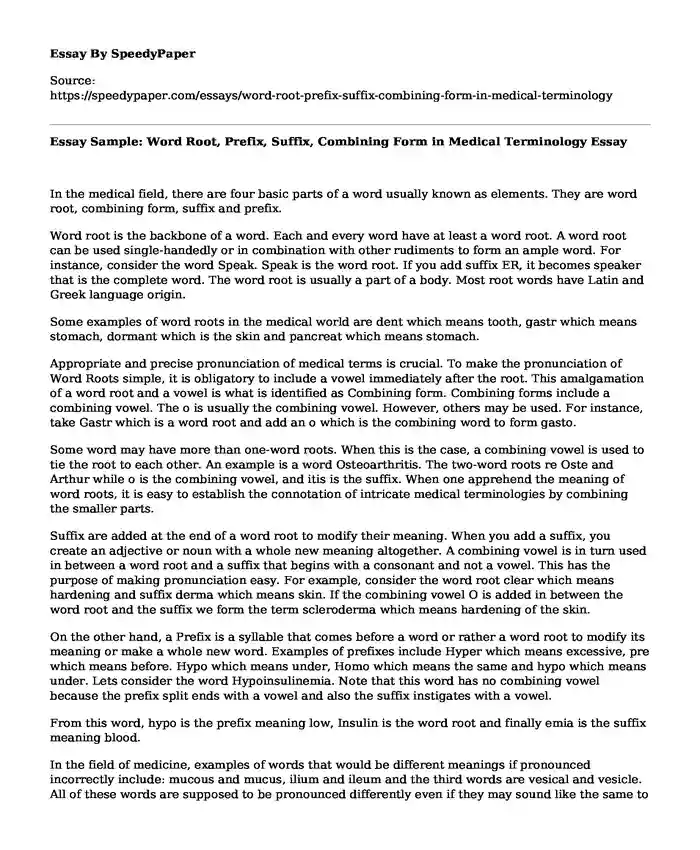
| Type of paper: | Essay |
| Categories: | Linguistics Medicine |
| Pages: | 3 |
| Wordcount: | 726 words |
In the medical field, there are four basic parts of a word usually known as elements. They are word root, combining form, suffix and prefix.
Word root is the backbone of a word. Each and every word have at least a word root. A word root can be used single-handedly or in combination with other rudiments to form an ample word. For instance, consider the word Speak. Speak is the word root. If you add suffix ER, it becomes speaker that is the complete word. The word root is usually a part of a body. Most root words have Latin and Greek language origin.
Some examples of word roots in the medical world are dent which means tooth, gastr which means stomach, dormant which is the skin and pancreat which means stomach.
Appropriate and precise pronunciation of medical terms is crucial. To make the pronunciation of Word Roots simple, it is obligatory to include a vowel immediately after the root. This amalgamation of a word root and a vowel is what is identified as Combining form. Combining forms include a combining vowel. The o is usually the combining vowel. However, others may be used. For instance, take Gastr which is a word root and add an o which is the combining word to form gasto.
Some word may have more than one-word roots. When this is the case, a combining vowel is used to tie the root to each other. An example is a word Osteoarthritis. The two-word roots re Oste and Arthur while o is the combining vowel, and itis is the suffix. When one apprehend the meaning of word roots, it is easy to establish the connotation of intricate medical terminologies by combining the smaller parts.
Suffix are added at the end of a word root to modify their meaning. When you add a suffix, you create an adjective or noun with a whole new meaning altogether. A combining vowel is in turn used in between a word root and a suffix that begins with a consonant and not a vowel. This has the purpose of making pronunciation easy. For example, consider the word root clear which means hardening and suffix derma which means skin. If the combining vowel O is added in between the word root and the suffix we form the term scleroderma which means hardening of the skin.
On the other hand, a Prefix is a syllable that comes before a word or rather a word root to modify its meaning or make a whole new word. Examples of prefixes include Hyper which means excessive, pre which means before. Hypo which means under, Homo which means the same and hypo which means under. Lets consider the word Hypoinsulinemia. Note that this word has no combining vowel because the prefix split ends with a vowel and also the suffix instigates with a vowel.
From this word, hypo is the prefix meaning low, Insulin is the word root and finally emia is the suffix meaning blood.
In the field of medicine, examples of words that would be different meanings if pronounced incorrectly include: mucous and mucus, ilium and ileum and the third words are vesical and vesicle. All of these words are supposed to be pronounced differently even if they may sound like the same to the ears. They consequently have different meanings.
Take it a lab technician explains to a doctor about a condition in the ileum, the third part of the small intestine, the doctor might misconceive the ileum to imply ilium the superior flaring part of the hipbone that would lead to a misdiagnosing the patient. On the other hand, a doctor may request his lab technician to test for bacterial infection in the mucus [noun] of his patient. The lab technician may decode the information wrongly and test for infection in the mucous {adjective}. The patients end up being treated for a complication that he doesnt have and the drugs taken for the wrong treatment could lead to death or other major complications.
When patients are admitted to a hospital, the nurse on call might erroneously check for a vessical {meaning the bladder} disorder instead of vesicle {small fluid-filled blister on the skin} condition as instructed by the doctor. In such a case, the progression of the patient will not have been observed by the nurse on call.
Cite this page
Essay Sample: Word Root, Prefix, Suffix, Combining Form in Medical Terminology. (2019, Jul 18). Retrieved from https://speedypaper.net/essays/word-root-prefix-suffix-combining-form-in-medical-terminology
Request Removal
If you are the original author of this essay and no longer wish to have it published on the SpeedyPaper website, please click below to request its removal:
- Psychology Essay Example: Salma's Personality
- Parents Supporting Reading Today - Learning Essay Sample
- Writing a Career Essay for Your Future Endeavors, Free Paper for Students
- Free Esay Sample on Curriculum
- Free Paper Example: Waste Management Lesson Plan
- Essay Sample on Human Resource Management Concepts
- Essay Sample. How Upper-Class Roman Women Exercised Autonomy
Popular categories




